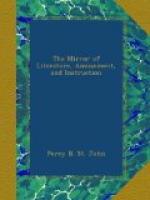Nicolo Paganini was born at Genoa, in February, 1784. We are not informed as to his father’s profession, if indeed he had any: all that we are told is, that his chief pursuit was to improve his circumstances, which were not the best in the world, by speculating in the lottery, so that when his little son, Nicolo, began at an unusually early age to give strong indications of musical talent, it seemed to him as if the wheel of fortune had at last been propitious, and he accordingly lost no time in setting to work to make the most of his prize. Having some skill on the violin himself, he resolved to teach him that instrument; and as soon as he could hold it, put one into his hands, and made him sit beside him from, morning to night, and practise it. The incessant drudgery which he compelled him to undergo, and the occasional starvation to which he subjected him, seriously impaired his health, and, as Paganini himself asserts, laid the foundation of that valetudinarian state which has ever since been his portion, and which his pale, sickly countenance, and his sunk and exhausted frame so strongly attest. As his enthusiasm was such as to require no artificial stimulus, this severe system could only have been a piece of cool and wanton barbarity. He already began to show much promise of excellence, when a circumstance occurred which not only served to confirm these early prognostications, but to rouse him to exert all his energies. This was no other than a dream of his mother, Theresa. An angel appeared to her; she besought him to make her Nicolo a great violin player; he gave her a token of consent;—and the effect which this dream had upon all concerned, we sober-minded people can have no idea of. Young Paganini redoubled his perseverance. In his eighth year, under the superintendence of his father, he had written a sonata, which, however, along with many other juvenile productions, he lately destroyed; and as he played about three times a week in the churches and at private musical parties, upon a fiddle nearly as large as himself, he soon began to make himself known among his townsmen. At this time he received much benefit from one Francesco Gnecco, who died in 1811, and whom he always speaks highly of.
In his ninth year, being applied to by a travelling singer to join him in a concert, he made his first public appearance in the great theatre at Genoa, and played the French air “La Carmagnole,” with his own variations, with great applause.
His father now resolved to place him under the tuition of the well-known composer, Rolla, and for that purpose took him along with him to Parma. The particulars of their interview afford a striking proof of the proficiency which he had by this time acquired. As Rolla happened to be ill and lying in bed, the party were shown into the ante-chamber, when, observing upon the table one of the composer’s newest concertos, the father beckoned to his son to take up his violin and play it, which he did at sight, in such a way that the sick man immediately started up, demanded who it was, and could scarcely be prevailed upon to believe that the sounds had proceeded from a little boy, and his intended pupil; but as soon as he had satisfied himself that that was really the case, he declined to receive him. “For God’s sake,” said he, “go to Paer, your time would be lost with me, I can do nothing for you.”




